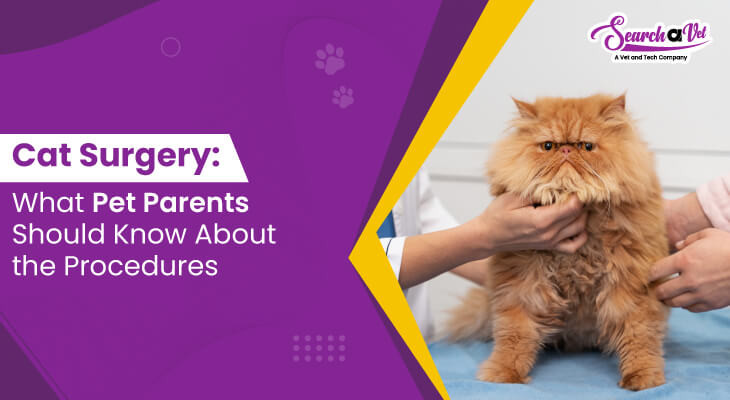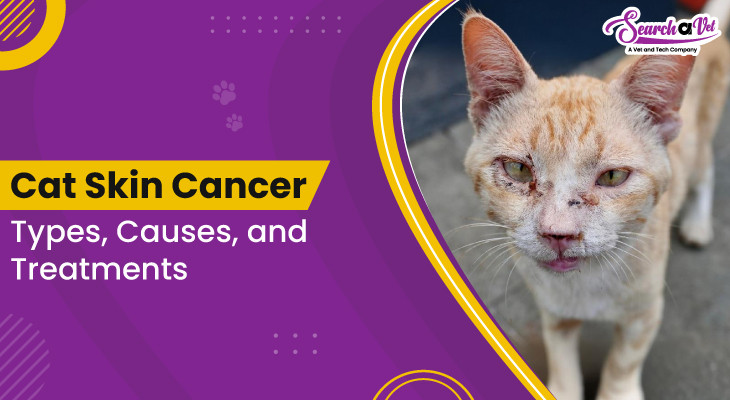Cat Surgery: What Pet Parents Should Know About the Procedures
 Aug 23, 2024
Aug 23, 2024

Do you own a pet, specifically a cat? Are you aware of your responsibilities regarding the health of your feline fellow?
You should always be prepared, as your beloved cat may require veterinary procedures to treat certain emergency medical conditions, alleviate pain, or prevent future health issues.
The idea of having your cat surgically operated, however, might be daunting and leave you with a lot of questions. This thorough guide can help with that.
Here, we'll cover everything from understanding the different types of cat surgery to preparing your cat for veterinary surgical procedures.
So don’t miss a single factor we’ll be discussing here!
Types of Cat Surgery
Depending on the particular medical problem or operation needed for the cat, veterinary procedures for felines might vary significantly.
Knowing the various cat surgery options can help pet owners better understand their cats' requirements and make wise selections.
Here are general procedures for cats:
Routine Surgeries
Primarily, routine surgeries include spaying and neutering. These are recommended for most cats to
- Prevent unwanted pregnancies
- Reduce the risk of certain reproductive complications
- Manage behavioral issues
Apart from that, vaccination is a crucial part of routine care to protect cats from various infectious diseases.
Emergency Surgeries
These surgeries are performed in response to urgent medical conditions or traumatic injuries.
Common examples include surgeries to
- Repair fractures
- Remove foreign objects
- Treat wounds, cuts, and bruises
In these conditions, prompt action is crucial to ensure the best possible care and prevent the onset of any complications in the future.
Elective Surgeries
Elective surgeries are optional veterinary procedures. These may be performed for cosmetic reasons or to address specific cat concerns.
The common elective procedures include cat cosmetic surgery, cosmetic tail docking, and dewclaw removal.
However, it's important for the cat owner to thoroughly discuss the benefits, risks, and ethical considerations with their veterinarian before opting for elective surgeries.
Specialized Surgeries
Specialized cat surgeries are typically performed by veterinary specialists with advanced training in specific areas.
These may include
- Orthopedic surgeries to address bone and joint conditions
- Soft tissue surgeries for organ-related issues
- Organ transplant procedures
Specific procedures, such as cat eye surgery and cat obstruction surgery, require specialized facilities and expertise. Mostly, these are recommended in complex or severe cases.
What is Cat Eye Surgery?
Cat eye surgery, often called feline ophthalmic surgery, encompasses various procedures to correct or treat eye conditions in cats. These surgeries range from minor corrective procedures to more complex operations addressing severe cat health issues.
Some common feline eye surgeries include:
- Entropion Surgery
- Cherry Eye Surgery
- Cataract Surgery
- Corneal Ulcer Surgery
- Glaucoma Surgery
- Lens Luxation Surgery
Reasons for Cat Eye Surgery
Below are the common reasons that prompts to cat eye surgery.
- Correct Vision Problems
- Relieve Pain and Discomfort
- Prevent Further Damage
- Enhance Quality of Life
- Treat Congenital Defects
- Address Injuries
- Prevent Chronic Infections
- Maintain Aesthetic Appearance
How to Prepare Your Cat for Surgery?
Preparing for cat surgery is crucial to ensure the procedure goes smoothly and your cat recovers quickly.
There are multiple factors you should consider.
Finding a Qualified Veterinarian
Choosing a qualified cat surgeon is essential to preparing for cat surgeries.
For that, you must look for a vet specialist who can perform the type of surgery your cat needs.
You can ask for referrals from other pet owners, research online reviews, and visit the veterinarian's office to get a feel for their practice.
They will provide you with a clear understanding of what to expect during your feline surgery and recovery process.
Discussing Potential Risks with Your Cat Surgeon
While most types of cat surgery are safe, some risks are always involved with all veterinary procedures.
Therefore, it’s important to discuss the potential complications with your veterinarian.
Some common risks associated with any cat procedure may include
- Infection
- Adverse reactions to anesthesia or medication
- Surgical site complications
You can make a sound decision once you and your vet have discussed the potential risks.
Preparing Your Cat at Home
One crucial step in preparing for any cat surgery is to prepare your cat at home after scheduling the procedure.
As part of the preparation for the treatment, your cat may need to fast for a certain duration and take any prescribed drugs.
Your cat's surgeon will give you detailed advice on how to prepare your cat for surgery and what to do before and after the surgery.
What to Expect in Cat Surgery?
As already mentioned above, most cat surgeries are safe; unfortunately, some complications can arise.
Knowing these possibilities can help you recognize signs of trouble and seek a prompt veterinarian’s help.
Some potential risks associated with feline surgeries are as follows.
Infection Risks
This is especially true in cats who have undergone surgical operations because if sterile measures are taken into account, there is a greater chance that the operated site may get infected.
Normally, any infection in the genital area produces symptoms such as redness, inflammation, pus, and a bad smell.
To avoid spreading the infection, early antibiotic treatment is important to avoid escalation of infection.
Possible Reactions to Anesthesia and Medications
Pets, especially cats, are able to have complications that are related to anesthesia or the medications given during surgery.
These reactions may be mild to severe and include:
- Allergic reactions
- Respiratory distress
- Organ dysfunction
To mitigate these risks, cat surgeons closely monitor cats during surgery.
Surgical Site Complications
Complications at the surgical site can include issues such as
- Dehiscence (wound opening)
- Excessive bleeding
- Formation of seromas or hematomas
These complications may require additional veterinary procedures, such as suturing or draining.
Anesthesia Risks
Anesthesia carries inherent risks, although they are minimal when performed by trained professionals.
Some cats may have underlying health conditions or sensitivities, and anesthesia can increase their risks.
Therefore, ask your veterinarian to evaluate your cat's health and recommend appropriate anesthesia protocols.
Delayed Healing
Sometimes, cat surgical incisions may take longer to heal than expected.
The following factors can contribute to delayed healing.
- Poor blood circulation
- Impaired immune function
- Certain medical conditions
Regular monitoring and follow-up visits with your veterinarian are crucial to identify and address any delays in the healing process.
Recovery from Cat Surgery
Cat recovery from surgery requires the pet owner's patience, attention, and care.
The duration of the recovery period usually depends on
- Type of surgery
- Severity of the condition
- Cat's overall health
Some general guidelines to ensure a quick and smooth recovery include
Postoperative Care
After the surgery, your veterinarian will provide specific instructions for postoperative care, including
- Medication administration
- Wound care
- Cat activity restrictions
To ensure proper healing and prevent complications, following these instructions carefully is crucial.
Rest and Recovery
Cats need plenty of rest and time to recover from surgery.
Therefore, pet owners should provide a quiet and comfortable environment for their cats to rest and avoid overstimulation.
Moreover, they should limit the cat’s physical activity and playtime as directed by your veterinarian.
Monitor for Complications
After the procedure, monitor your cat's incision site for signs of infection. Mostly, there can be swelling, redness, or fluid discharge.
Plus, don’t forget to watch your cat for changes in appetite, especially cat behavior after pu surgery, or activity level.
Never delay reporting any concerns to your veterinarian.
Nutrition and Hydration
Providing proper nutrition and hydration to the cat is crucial for a successful recovery.
Offer small, frequent meals of high-quality food and plenty of fresh water.
Avoid feeding your cat table scraps or treats during the recovery period.
Follow-up Visits
Follow-up visits with your veterinarian are essential to
- Monitor your cat's progress
- Remove any sutures or staples
- Adjust medications as needed
Don't miss out on attending any follow-up appointments to ensure the best possible care and quicken the healing process.
Supporting Your Cat's Recovery
After cat surgery, ensuring proper care and support throughout the recovery period is essential.
Here are some ways to support post-surgery cat care and recovery.
Creating a Comfortable Environment
To create a comfortable environment,
- Set up a quiet, cozy space for your cat to rest and recover.
- Provide them with a warm and comfortable bed.
- Keep the cat away from the noise and other pets.
Providing Love, Care, and Attention
To speed up healing during recovery time,
- Offer your cat plenty of love, care, and attention.
- Spend time with them, pet them gently, and provide reassurance.
This emotional support will make your cat stress-free and aid in their recovery.
Engaging Your Cat in Gentle Exercises and Physical Therapy
Depending on the nature of the surgery, your vet may recommend gentle exercises or physical therapy for your cat to quicken the recovery.
You must have to follow the instructions accordingly.
Resultantly, these activities help improve mobility, prevent muscle atrophy, and promote overall healing.
Addressing Behavioral Changes or Anxiety
Being a pet owner, you must know that every cat is unique, and the recovery process may vary.
Feline surgery can sometimes lead to behavioral changes or anxiety.
In such cases, your vet can provide guidance on techniques or medications to help ease anxiety and ensure your cat’s comfort during the recovery.
Also, follow your veterinarian's postoperative instructions carefully, including medication administration and dietary restrictions.
What are the Preventive Measures to Avoid Cat Surgery?
Many of the veterinary procedures for cats are unavoidable
However, preventive measures can help minimize the chances of your cats requiring surgery.
The most important factors are as follows.
Responsible Pet Ownership and Regular Veterinary Care
If you’re a responsible pet owner, you can manage to prevent the need for cat surgery.
This is possible by
- Providing a stimulating and safe environment
- Maintaining balanced nutrition
- Ensuring regular veterinary check-ups
Apart from that, routine exams can help detect and address cat health issues early on, preventing the need for surgical intervention.
Spaying/Neutering (Common Cat Surgery)
Spaying (for female cats) and neutering (for male cats) are important veterinary surgical procedures that ensure many health benefits.
Above all, in cats, spaying and neutering reduces the risk of
- Certain cancers
- Eliminate reproductive-related issues
- Help reduce behavioral problems like aggression or roaming tendencies.
Proper Nutrition and Exercise
A well-balanced diet and regular exercise are vital for maintaining your cat's overall health and weight management.
Owing to obesity, there can arise various health problems in cats, including
- Orthopedic issues
- Diabetes
- Cardiovascular diseases
So, it’s wise to consult with your veterinarian. They will determine the diet and exercise as per your cat's specific needs.
Minimizing Potential Hazards
Cats are curious creatures. Therefore, creating a safe environment for them to minimize potential hazards is crucial.
- Securely store household chemicals
- Keep toxic plants out of reach
- Ensure your cat has limited access to areas like balconies or open windows
Taking these precautions can reduce the likelihood of accidents or injuries, minimizing the probability of cat surgeries.
How to Minimize the Need for Cat Veterinary Procedures?
For some conditions in cats, invasive procedures become necessary.
Pet owners can take some steps to minimize the need for cat veterinary procedures.
These are as follows.
Maintaining Dental Hygiene
In felines, good oral hygiene is crucial. It helps prevent dental diseases that may prompt cat surgery.
Therefore, a responsible cat owner should implement regular dental care, including
- Brushing the cat's teeth
- Providing dental treats or toys
- Scheduling professional dental cleanings as per the veterinarian’s recommendations
Vaccinations and Preventive Medications
Staying up to date with vaccinations is essential to prevent infectious diseases in felines.
Additionally, it’s necessary to follow your veterinarian's recommendations for preventive medications.
These may include flea and tick control or heartworm prevention.
As a result, these preventive medications can avoid specific cat health issues that may require surgery later on.
Regular Health Monitoring
Keep an eye on your cat's overall health and behavior.
Monitor for any changes in
- Appetite
- Water intake
- Litter box habits
- Mobility
- Behavior
If you feel anything abnormal, don’t be late to report to your veterinarian promptly.
Early intervention can often prevent the need for more invasive procedures.
Also Read: How to take care of a cat with kidney disease
To Conclude!
There’s nothing wrong with saying that cat surgery can be a challenging experience for a pet owner.
However, with the right knowledge and preparation, you can ensure the best possible outcome for your beloved feline companion.
Search a Vet provides a dynamic platform for pet owners to learn about their pet health. We connect you to top veterinarians, animal hospitals, and veterinary clinics to get smooth online vet appointment and consultations in a single platform and from the comfort of your home or office.
We aim to bridge the gap between pet parents and animal health care professionals to make pet health more accessible.
Search a Vet also enables pet parents to address common cat diseases and schedule their surgeries by locating the most reliable clinic in their area.
Getting expert veterinary advice for your pet has never been this easy.
FAQs
How should my cat get ready for surgery?
Use your veterinarian's directions exactly to get your cat ready for surgery.
Verify whether your cat has had the pre-operative diagnostics and administer the required vaccines. Also, before the procedure, create a cozy space for your cat.
What should I expect during the recovery following cat surgery?
The kind of operation and the cat's condition will affect the recuperation time. Initially, your cat will get confused.
The greatest advice is to progressively bring regular activities back into your cat's daily routine by following the postoperative care recommendations given by her physician.
Does cat surgery bring potential risks?
Any surgery for the cat has common hazards, including infection, negative anesthetic responses, and surgical site problems.
However, these risks can be neglected to a greater extent when experienced feline surgeons perform the surgeries.
What should you do when a cat shows signs of complications after surgery?
If you observe any indications of problems following surgery, see your veterinarian right away. They can offer direction and decide whether more medical action is required.
What is the possible cost of a cat surgery?
Several elements can affect the cost of feline surgery, including the type of procedure, degree of difficulty of the operation, and geographic location.
Cat surgery may normally cost between $200 and $2,000 or more. Still, it's important to determine the cost with a veterinarian's office before the surgery is performed.




